#Tom Slater
Explore tagged Tumblr posts
Text

By: Tom Slater
Published: May 1, 2024
The Columbia cranks rant about killing Zionists one minute and demand hot meals the next.
If you want to know what’s driving the Israelophobic protests and occupations at New York’s Columbia University – and many more elite campuses across America – get a load of this clip that has been doing the rounds on social media over the past 24 hours.
In it, one Johannah King-Slutzky – spokesperson for the occupation of Columbia’s Hamilton Hall, which was forcibly ended by the New York City Police Department last night, with around 100 arrests – issues her and her comrades’ demands. On top of Columbia ‘divesting’ from Israel and such, King-Slutzky also demanded meals and water.
Apparently, Columbia was refusing to allow the students who were then breaking windows and barricading themselves inside Hamilton Hall to access their usual canteen grub. ‘We’re saying that [Columbia is] obligated to provide food to students who have paid for a meal plan here’, King-Slutzky told a sceptical press conference.
When pushed, she said they were only asking that supplies be allowed to be brought in:
‘Do you want students to die of dehydration and starvation or get severely ill, even if they disagree with you?… I mean, it’s crazy to say because we are on an Ivy League campus, but this is like basic humanitarian aid we’re asking for. Like, could people please have a glass of water?’
It’s all there. The whinging cadence, the ‘like’-strewn patter, the obligatory keffiyeh, the industrial-strength victimhood, the bloke in a crop top stood behind her… King-Slutzky and Co are the picture of trustafarians in revolt. Their anti-Israel bigotry is matched only by their profound sense of entitlement. How dare the university not provide adequate refreshments while we are smashing shit up?
There are plenty of people today likening the Columbia meal-planners to their Sixties forebears – in particular, to the Columbia radicals who mounted their own disruptive demos in 1968. Sadly, even some veterans of Sixties activism are flattering today’s privileged brats with the comparison.
But it’s bollocks. When Columbia students occupied Hamilton Hall and other buildings in April 1968, they did so to oppose the Vietnam War and university plans to build a gymnasium in nearby Harlem, which students argued would effectively be segregated. After a week, police moved in and arrested 700 students.
Today, Columbia students and their off-campus heavies aren’t opposing war exactly. Yes, they oppose Israel’s assault on the genocidal lunatics of Hamas, following the Islamist terrorists’ vicious pogrom on 7 October. But they seem pretty relaxed about warfare against the state of Israel. ‘We don’t want no two states / We want all of it!’, they chant. ‘Never forget 7 October… 7 October is about to be every fucking day for you. You ready?’, screeched one racist cunt outside the gates.
Therein lies another crucial difference between ’68 and today. Today’s students aren’t fighting racism, they are luxuriating in it. Khymani James, a leader of the Columbia protests, posted a video to social media the other week saying ‘Zionists don’t deserve to live’. ‘I don’t fight to injure or for there to be a winner or a loser, I fight to kill’, he said, fantasising about having a scrap with one of those awful Jews. (Given the vast, vast majority of Jews are Zionists, that’s really not overegging it.)
Elsewhere, we’ve seen protesters chant ‘Go back to Poland’ at Jewish Columbians and hold up homemade signs, stating ‘Al-Qasam’s [sic] next targets’, pointing to a group of Israeli-flag-waving students. The Al-Qassam Brigades being Hamas’s military wing. An Arab Israeli was also punched outside Columbia recently, by activists brandishing the pro-Hamas triangle symbol.
I’m willing to concede that some of this unvarnished, violent hatred is being carried out by off-campus antifa types, as is routinely alleged by the protesters’ apologists. Not least because King-Slutzky and yer man in his crop top look like they couldn’t fight their way out of a ball pit. But activists’ alarmingly high tolerance for virulent anti-Semitism, their total lack of condemnation of Hamas or its many campus fanboys, speaks volumes.
As does their expectation of water and spag bol and their apparent shock and horror when the police were called in. The Columbia protesters and their supporters are now trying to portray the clearance of Hamilton Hall as an affront to freedom of speech. Free speech is ‘supposed to be prized’ on campus, one student told Al Jazeera last night.
Being concerned about a heavy-handed response to these demos is one thing. The governor-ordered crackdown on protests at University of Texas at Austin, for example, has been nakedly authoritarian and censorious. But there is no inalienable right to break into and occupy university buildings. (Nor is there an inalienable right to constantly harass Jewish students as they try to move around campus.)
As the Foundation for Individual Rights and Expression (FIRE) points out, civil disobedience is not the same as expressing an opinion or engaging in peaceful protest. The whole point of it is to break the rules. Indeed, it ‘derives expressive power from the willingness of participants to accept the consequences of breaking the rules’. That these students and junior academics are shocked to be handcuffed for breaking the law reveals a profound sense of entitlement among young ‘radicals’.
We shouldn’t be surprised. FIRE president Greg Lukianoff has pointed to two dispiriting, parallel trends in American universities: a willingness to curtail free speech, all while giving a green light to violent, intolerant protests. At the University of California, Berkeley, where students rioted in 2017 because that tiresome weirdo Milo Yiannopoulous was speaking, the university ‘showed cowardice in its unwillingness to punish the rioters’, writes Lukianoff and Angel Eduardo in a recent op-ed. We saw a similarly rank capitulation at Evergreen State that same year, where marauding students were effectively allowed to chase professors Bret Weinstein and Heather Heying off of campus. Since then, ‘shutdowns and shout-downs have become commonplace’, they write.
Some critics of campus cancel culture have been caught off guard by the pro-Hamas protests. Almost a decade ago, they observe, we were all gawping at the ‘Yale Snowflakes’, those absurd Ivy Leaguers who went into open, teary-eyed revolt because academic Erika Christakis sent them an email saying they should chill out about offensive Halloween costumes. How did babyish offence-taking give way to open support for anti-Semitic terrorists?
But it all makes a perverse kind of sense. Students taught that freedom of speech is a form of violence have begun to see violence as a form of free speech. Young radicals reared on a crude, conspiratorial racial identity politics have begun to apply it to geopolitics, with predictably anti-Semitic results. A new generation of elite youth, overprotected and indulged in equal measure, have come to think they can do no wrong.
So let’s retire the Sixties comparisons. In 1964, when Mario Savio – civil-rights activist and student leader of the Free Speech Movement – was leading a campaign of civil disobedience, aimed at liberating Berkeley students from censorship, his cause was just and he was happy to suffer the consequences of his methods. ‘There is a time when the operation of the machine becomes so odious’, he famously said, ‘you’ve got to put your bodies upon the gears and upon the wheels… you’ve got to make it stop!’. Meal plans did not get a mention.
At the same time, let’s not pretend that today’s revolting students just appeared, fully formed, from the womb. They are the products of an academic and upper-class culture that has kindled their prejudices and inflamed their intolerance. They aren’t revolutionaries. They’re bigoted brats. And they’ve been pandered to for far too long.
==
Students taught that freedom of speech is a form of violence have begun to see violence as a form of free speech.
This is an important point. The people who insisted that "words are violence" and that "misgendering" someone is as good as murdering them, are busy trying to pretend that their violence and destruction is merely a form of protected free speech and opinion expression.
It's not. They're trying to gaslight society.
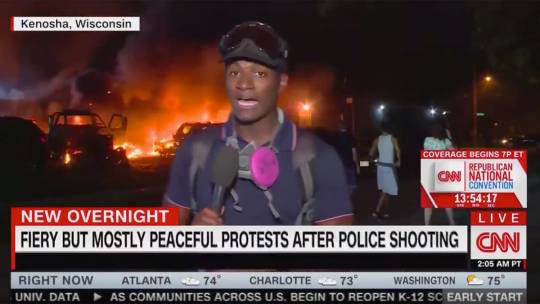
If you're too stupid or too ideologically compromised to stand up and go get a glass of water, you probably should remove yourself from the gene pool.
#Tom Slater#israel#antisemitism#Israelophobia#terrorist scarf#Columbia University#terrorism supporters#Hamas supporters#pro hamas#hamas massacre#hamas terrorism#hamas#hamas supporters#islam#islamic terrorism#palestine#pro palestine#religion is a mental illness
28 notes
·
View notes
Text










31 DAYS OF HALLOWEEN 1990's edition — (14/31) ↳ Interview with the Vampire (1994)
#interview with the vampire#iwtvedit#horroredit#horrorgifs#filmedit#filmgifs#tom cruise#brad pitt#kirsten dunst#christian slater#moviegifs#31halloween24
364 notes
·
View notes
Text

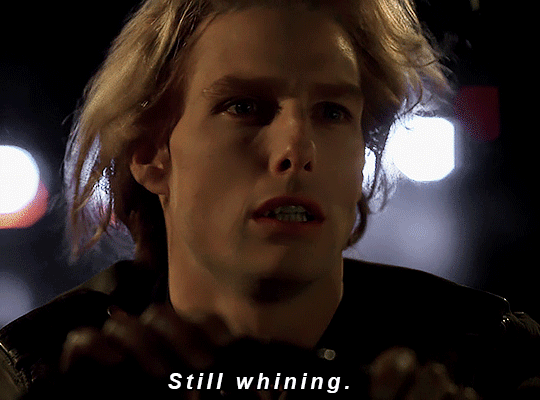
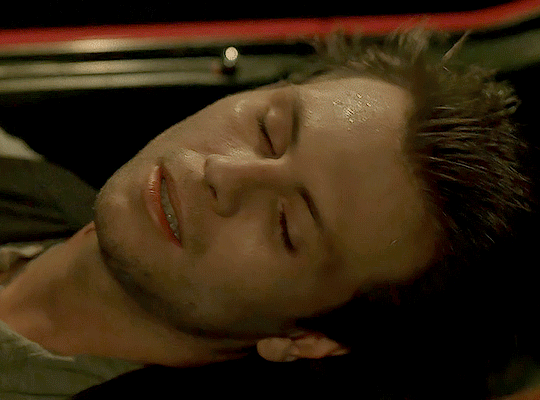



Interview With The Vampire: The Vampire Chronicles (1994)
#Horror#Horroredit#Interview with the Vampire: The Vampire Chronicles#Neil Jordan#Tom Cruise#Christian Slater#Lestat De Lioncourt#CHB#Quotes#1994#90s
2K notes
·
View notes
Text
“Utter crackers” is right!!!

58 notes
·
View notes
Text

this is my absolute favourite frame in the 90's iwtv movie. it makes me piss meself laughing every single time.
#god bless u neil#interview with the vampire#interview with the vampire 1994#neil jordan#iwtv#iwtv 1994#Anne rice#the vampire chronicles#lestat de lioncourt#daniel malloy#tom cruise#christian slater#iwtv meme#iwtv shitpost
54 notes
·
View notes
Text



























INTERVIEW WITH THE VAMPIRE (1994)
Director: Neil Jordan Cinematography: Philippe Rousselot
#interview with the vampire#the vampire chronicles#anne rice#iwtv#brad pitt#tom cruise#kirsten dunst#antonio banderas#christian slater#stephen rea#lestat de lioncourt#louis de pointe du lac#claudia#daniel molloy#armand#neil jordan#90s#90s movies#90s horror#90s horror movies#vampire#vampires#vampire movies#cinematography#movie screencaps#movie screenshots#movie frames#film screencaps#film screenshots#film frames
130 notes
·
View notes
Text

Brad Pitt's fang test shots for Interview with the Vampire (1994) dir. Neil Jordan
I found this and then I thought, bro was he originally supposed to play Lestat? And Tom Cruise fought his way in? Because I can see Christian Slater as Louis and it would explain him being in the movie in the first place. The Interviewer role, or Daniel Molloy as we know him as now, was a small role most actors of the time could have played.
Christian Slater wasn't small potatoes in 1994. And That freewheeling Lestat vibe was totally Brad Pitts style, and still is. No wonder he felt miscast.
But "OFFICIALLY" Brad Pitt was never offered the role of Lestat, but who knows what's true in Hollywood?
Now I am stuck imagining the world where that was the cast of the movie.
#brad pitt#fangs#test fangs#vampire#interview with the vampire#interview with the vampire film#louis de pointe du lac#lestat de lioncourt#tom cruise#christian slater#daniel molloy#travesty
75 notes
·
View notes
Text
Can you believe there's a universe where Antonio Banderas and Christian Slater are making out gay and sloppy in the city nightlights. Timelines take me there
#the 90s had us all on fucking crack cocaine huh#can u believe EITHER that brad pitt fucked a baby into tom cruise in this same universe??? hnnngggg#interview with the vampire#armandiel#armaniel#loustat#iwtv#antonio banderas#christian slater
55 notes
·
View notes
Text

The cast of Interview With The Vampire, 1994.
#interview with the vampire movie#christian slater#tom cruise#kirsten dunst#antonio banderas#brad pitt#1990s#actual 1990s
30 notes
·
View notes
Text










Interview with the Vampire (1994)
dir. neil jordan
#interview with the vampire#interview with the vampire 1994#tom cruise#brad pitt#kirsten dunst#antonio banderas#christian slater#costume drama#costume horror
157 notes
·
View notes
Text

Jill Talley coming out here to clarify that Ariana Grande did NOT take her man
#This whole thing is killing me#Tho Ethan leaving his pregant wife for Ariana is FOUL#its not my business tho#the spongebob connoisseur#spongebob squarepants#spongebob#sb#spongebon squarepants#spongebob meme#Tom Kenny#Jill Talley#ethan slater#Ariana grande#the spongebob musical#spongebob broadway
177 notes
·
View notes
Text

By: Tom Slater
Published: Mar 30, 2024
‘Forte non Ignave’, ‘Bravely not cowardly’, is the motto of Batley Grammar, a free school in West Yorkshire, founded in 1612. How grimly ironic, then, that three years ago, it became the site of one of the most craven capitulations to religious bigotry Britain has seen since the Satanic Verses controversy.
On Monday 22 March 2021, a religious-studies teacher at Batley Grammar showed his pupils cartoons of the Prophet Muhammad, as part of a lesson on blasphemy. The cartoons were from Charlie Hebdo, the satirical French magazine whose staff paid the ultimate price for their supposed blasphemy in 2015, when two al-Qaeda gunmen showed up at their offices.
The cartoons had been on the syllabus for at least two years, and no one had batted an eyelid. Up to that point, Batley Grammar – a secular state school – had no reason to suspect it should have to respect Islamic blasphemy codes, especially when teaching about religion, free speech and blasphemy. It was in for a rude awakening.
‘The lesson descended into chaos as pupils took out their phones and attempted to film the teacher’, according to one report. The teacher, according to another, had a heated phone call with the father of one Muslim pupil. Then things spun out of control. Word got out online. Protesters – a mix of parents and activists from Leeds, Rochdale and beyond – pitched up outside the school gates, shutting down the school for a number of days.
All the while, the teacher was menaced by death threats. A local Islamic charity, Purpose of Life, published a statement, outing the teacher and comparing his indiscretion – bizarrely – to the brutalisation of Rohingya Muslims in Myanmar. A group called Muslim Action Forum also published his name, alongside more lurid libels, accusing the teacher of ‘inciting hatred’ and accusing his supporters of ‘blind hatred of the Muslim community’. These groups were, in effect, putting a target on the back of a man they had likely never met. Young men were spotted knocking at the door and trying the handle of the teacher’s house, where he lived with his wife and their children.
The bigoted caricature bore no relationship to reality, of course. According to the teacher’s Muslim neighbour, his was a nice family, who bought cards and sweets for the Muslim kids in the neighbourhood during Eid. Even so, no one should be expected to go through what this teacher went through – facing all the violent intolerance and hysteria of a medieval village, only spread far and wide by social media. He spoke to Dame Sara Khan, for her new report on modern-day mob censorship, which was published by the UK government this week. His treatment, Khan writes, left the teacher feeling suicidal.
He feared for his life, and with good reason. Five months before that fateful religious-studies class in West Yorkshire, French teacher Samuel Paty was beheaded in a Paris suburb by an Islamic extremist. Paty’s ‘crime’ was almost identical: showing Charlie Hebdo cartoons to his pupils in a lesson on freedom of expression. Adil Shahzad, an imam from Bradford who shot straight to Batley to lead the protests, warned darkly at the time that Britain risked ‘becoming like France’. Shahzad insisted Muslims should make their feelings known in the ‘democratic way’. But it turns out he has a history of praising murderous anti-blasphemy groups in Pakistan.
Where Britain after Batley certainly differed from France after Paty was in the reaction. Thousands took to the streets in France, in solidarity with the slain teacher and in support of free expression. The murder inspired President Emmanuel Macron to mount a personal crusade against Islamist extremism. In Britain, there was just capitulation. The school suspended the teacher and penned a grovelling apology. For some reason, a West Yorkshire Police officer was enlisted to read it out to the protesters. All this was welcomed heartily by Labour’s Tracy Brabin, then MP for Batley and Spen. She said she was ‘pleased that the school has recognised it was inappropriate and apologised’. After an investigation, the teacher was cleared of any personal wrongdoing, but the cartoons were removed from the syllabus. The mob won. And the teacher is still in hiding.
None of this has calmed tensions, of course. It has only emboldened the hardliners. Capitulation always does. There’s been a string of similar blasphemy scandals since. In 2022, Sunni Muslim protesters managed to get Cineworld to pull screenings of The Lady of Heaven, a Shia-made film they deemed to be blasphemous. In 2023, another school, less than 10 miles from Batley Grammar, this time in Wakefield, found itself in the zealots’ crosshairs, after a schoolboy brought a Koran to school and accidentally scuffed it. He too was bombarded with death threats. In the end, the police took no action against those trying to intimidate a child. A child who also happened to be autistic. But they did record a ‘non-crime hate incident’ against him.
A hardworking teacher forever looking over his shoulder. Shias censored at the behest of sectarians. A schoolboy threatened with death and arson. This is the cost of our cowardice, of our institutions’ inability to make clear that no one can expect to have their views forcefielded from criticism and that a free society cannot tolerate violence and threats in response to mere speech, words, cartoons. Blasphemy trials are back – only they are conducted by the mob, rather than a court. We’ve sent out a signal – loud and clear – that threats and violence and intimidation work.
And we’ve done so due to some genuinely bigoted assumptions about British Muslims. The first is that they are incapable of being citizens of liberal democracies – that, unlike any other religious group, they should expect to have their heretics burned, or at least punished. The second misconception is that the screeching rent-a-mobs that now show up whenever a ‘blasphemy’ scandal erupts are the authentic voice of British Muslims. They’re not. In fact, British Muslims and ex-Muslims are often on the sharp end of anti-blasphemy intolerance. In 2016, Glasgow’s Asad Shah and Rochdale’s Jalal Uddin both lost their lives, within weeks of each other, for their respective ‘blasphemies’. Hatun Tash, an ex-Muslim turned Christian preacher, has been stabbed and been the target of a terror plot for railing against her former faith. Thankfully, she’s still alive.
Three years on from Batley Grammar, we need to fight for the right to blaspheme all over again, before any more Brits – Muslim, non-Muslim or ex-Muslim – pay the price for our cowardice.
==
Said it before and I'll say it again: start revoking citizenship and deporting those who make these threats. They're trying to make our liberal societies into their Islamic hellholes.
#Tom Slater#Batley Grammar#blasphemy#censorship#blasphemy laws#islam#islamic violence#religion of peace#religion#islamic supremacy#cowardice#islamophobia#religion is a mental illness
9 notes
·
View notes
Text
shit my dad says while watching interview with the vampire (1994)
“so are these guys supposed to be gay”
“this whole movie’s fine except tom cruise looks stupid”
“i love christian slater’s hair” (like father like daughter)
“claudia makes this movie better it improves when she shows up”
#kittyposting#dad tag#currently watching#currently rewatching#films#iwtv#loustat#christian slaypurr#christian slater#claudia de lioncourt#mine#tom cruise tw#loumand
29 notes
·
View notes
Text

Glen Powell and Christian Slater at Netflix's Hit Man LA Tastemaker Screening at Ross House - 09.14.24 - 📸 Presley Ann
#real talk: do you think they talked about interview with the vampire - namely tom cruise also being super blonde#glen powell#christian slater#*
24 notes
·
View notes
Text
The Vampires Digital Media Poll: Round 2, Bracket 1
Creator's note: I recommend taking extreme caution as you vote for this one. It is easy to accidentally confuse these two, so be careful when choosing.
Please reblog for a bigger sample size.
Results get posted on December 20th. at 5PM CST.
| Next poll ->
If you wish to learn more about your options, either as a refresher or an introduction, press the "Keep reading" button.
What is Interview with the Vampire (1994) about?
Summary: "Born as an 18th-century lord, Louis is now a bicentennial vampire, telling his story to an eager biographer. Suicidal after the death of his family, he meets Lestat, a vampire who persuades him to choose immortality over death and become his companion. Eventually, gentle Louis resolves to leave his violent maker, but Lestat guilts him into staying by turning a young girl -- whose addition to the "family" breeds even more conflict." Source: Rotten Tomatoes
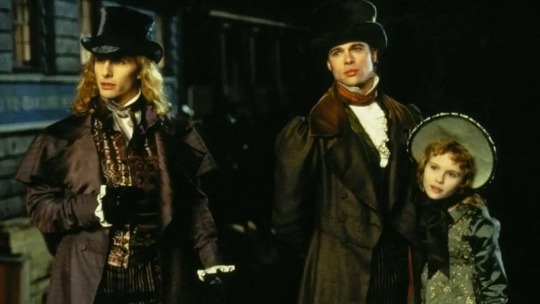
Source: Interview with the Vampire (1994)
Cast:
Brad Pitt - Louis de Pointe du Lac
Tom Cruise - Lestat de Lioncourt
Kirsten Dunst - Claudia
Christian Slater - Daniel Molloy
Antonio Banderas - Armand
Note: Cast lists provided here are not complete lists of people and characters featured in the media being listed. These are partial lists that include some of the main characters and their actors.
Additional information: This movie is based on the Anne Rice novel of the same name. Anne Rice was an author who wrote 13 books for her book series The Vampire Chronicles, which starts with the book, The Interview with the Vampire. In 2022, a tv show of the same name was created, also based on the book(s).
What is Interview with the Vampire (2022) about?
Summary: "In the year 2022, the vampire Louis de Pointe du Lac lives in Dubai and seeks to tell the story of his life or afterlife to renowned journalist Daniel Molloy. Beginning in early 20th-century New Orleans, Louis' story follows his relationship with the vampire Lestat [de] Lioncourt and their formed family, including teen fledgling Claudia. Together, the vampire family endures immortality in New Orleans and beyond. As the interview continues in Dubai, Molloy discovers the truths beneath Louis' story." Source: Rotten Tomatoes
Note: Rotten Tomatoes incorrectly labels Lestat de Lioncourt as "Lestat du Lioncourt". This is corrected by me via brackets.
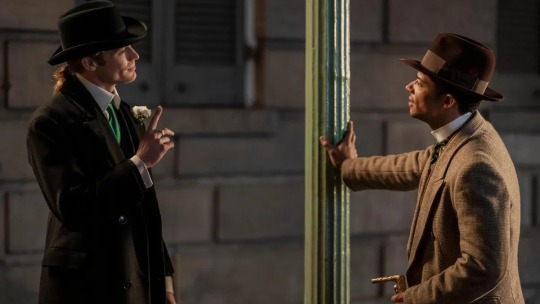
Source: Interview with the Vampire (2022)
Cast:
Jacob Anderson - Louis de Pointe du Lac
Sam Reid - Lestat de Lioncourt
Bailey Bass - Claudia (will be replaced by Delainey Hayles in the next season)
Eric Bogosian - Daniel Molloy
Assad Zaman - Armand
Note: Cast lists provided here are not complete lists of people and characters featured in the media being listed. These are partial lists that include some of the main characters and their actors.
Additional information: This tv show is based on the Anne Rice novel of the same name. Anne Rice was an author who wrote 13 books for her book series The Vampire Chronicles, which starts with the book, The Interview with the Vampire. Previously, in 1994, a movie of the same name was created, also based on the book(s).
#the vampires digital media poll#vampires#polls#tumblr polls#interview with the vampire#brad pitt#louis de pointe du lac#tom cruise#lestat de lioncourt#kirsten dunst#the vampire claudia#christian slater#daniel molloy#antonio banderas#armand#amc iwtv#jacob anderson#sam reid#bailey bass#delainey hayles#eric bogosian#assad zaman#the vampire armand
63 notes
·
View notes
Text








Super cousins.
#superman#supergirl#christopher reeve#helen slater#tom welling#laura vandervoort#tyler hoechlin#melissa benoist#henry cavill#sasha calle
11 notes
·
View notes